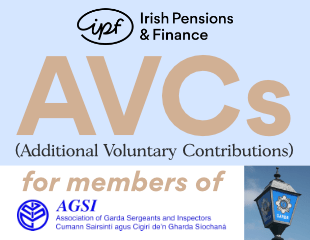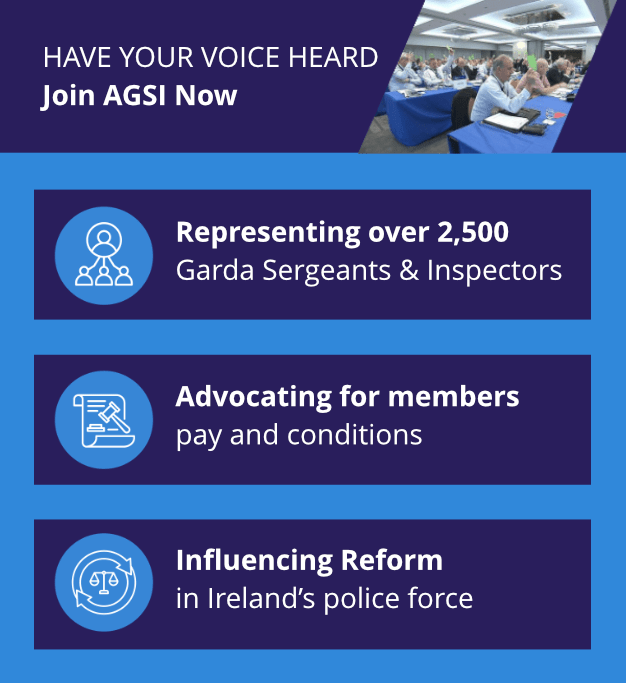
The Association of Garda Sergeants and Inspectors, in a pre-Budget submission to Finance Minister Michael Noonan, has called for and extension of the February deadline for members to retire with pensions and gratuity paid under 2009 salary rates. The association has also called for more resources to deal with white collar crime, for finance to be provided for IT systems to operate the proposed new rostering system (not yet finalised), the performance management system and the various elements of the Garda Information and Communications Technology strategy – all elements of the Croke Park Agreement.
Croke Park Agreement
The Croke Park Agreement has great potential to be of enormous benefit to An Garda Síochána and for the police service in this country. Agreement has been reached in a number of areas and the parties are close to agreement on the remaining items. However, the benefits of the agreement will be to a large extent negated if the funding is not available to put the necessary systems, including IT systems, in place to maximize the benefits.
Rosters – to maximize the benefits of the negotiations on rosters the IT systems to micro-manage it is an absolute requirement. Training will also be required for our members in order to operate the new rosters for maximum benefit.
Performance Management – an IT system is an absolute requirement, coupled with appropriate training. The PALF system is due to ‘go live’ in January but as yet no funding is in place for the IT or the training.
VIP visits
It is to be deplored that the Garda Síochána has had to foot the €36m policing bill from the state visits of Queen Elizabeth and US President Barack Obama last May.
These national events have been a cause of great pride to the gardaí because of the professional manner in which our members and gardaí carried themselves. It is disgraceful that the money has not yet been restored to the already under strain Garda budget and this should take place without further delay. The visits were not announced until this year, so there was no provision in the garda budget for the additional cost. All garda leave and rest days were cancelled for the visits and gardaí on duty had to work longer than normal shifts.This association asks you to ensure that the garda service does not suffer as a result of this shortfall, and that measures be put in place to ensure that this does not happen again.
White Collar Crime
The range and complexity of the investigations into the banking sector have been well documented and the 2011 Conference of the Association of Garda Sergeants and Inspectors approved a motion calling for more resources to be allocated to the relevant sections of An Garda Síochána to enable investigations to proceed with all speed and relevant prosecutions to follow. It is still a national scandal that those responsible for bringing down the economy of the country have not yet been brought to justice. The Government should provide sufficient resources to enable these prosecutions to be brought with the minimum of further delay.
Extend February deadline
We have already written to you about the internal garda study that disclosed a potential 1,200 retirements from An Gharda Síochána between September 2011 and the end of February, 2012. We are deeply concerned at the effects 1,200 retirements will have on the force, the vast majority of these will be of the more mature and experienced members and their departure will deprive the garda organisation of a huge pool of knowledge and expertise. Their departure will also add to the already intolerable burden on members who continue to serve because the additional workload will devolve onto their shoulders.You passed our letter to Mr Brendan Howlin, Minister for Public Expenditure and Reform, but I regret to say that his response has been totally negative and unhelpful. We have sought a meeting with him but to date have received no reply.
We asked, and we now repeat that request for the Government to extend the deadline of the end of February, 2012, for members to retire on pension and gratuity based on 2009 income, to remove the pressure on relevant members to retire. These members have spent a lifetime in the service of the state, and on many occasions have placed their lives on the line to preserve the peace. We are of course aware of the condition of the country’s finances, but we feel that extending this deadline by one year will not further endanger the position of the country but will give the relevant members more time to prepare to retire and more time to the garda organisation to skill up and intensify training of those who will have to pick up the additional responsibilities.
We realize that the Government has already adopted a policy to reduce the numbers in An Garda Síochána but we would respectfully point out that the policy was adopted without consultation with the staff side, and we were not afforded any opportunity to make any submissions prior to the policy being adopted. We would have urged that a longer timeframe be used to scale down the force in order to allow members a longer transition period to prepare for retirement – and also to protect the service to the public in so far as that is possible.As taxpayers and as members of local communities we have always contributed to Government and to the economy, both local and national. We have already suffered the Income Levy (increased from 1% to 2%), Pension Levy, 7% Pay Cut, and a cut in overtime. We have foregone 3.5% and a 2.5% pay increases due, not to mention the expectation of future pay increases. Pensioners have been hit with the Public Service Pension Reduction.
We note that Government has stated that income tax rates will not be increased, but this does not rule out further blows to our income if tax credits are reduced and tax bands narrowed, the result would be the same. Indirect taxes and increased hospital charges have already hit us hard.
Our members, and those of the other emergency services, put their lives and their well being on the line while paying their taxes, PRSI and pension contributions at source. We take the risks, but we also pay our share. We are not immune to the effects of the recession, as some media and political commentators would have us believe. Our children and family members have also been made unemployed or have had to emigrate to the four corners of the world, and they are being financially supported by our already hard pressed members.Our members are not among the wealthy elite and they do not enjoy an elaborate lifestyle, they should not be penalized any further.
End of year de facto penalty
We also ask you to end the present unfair situation affecting our members in that income earned in one year can be taxed at a higher rate the following year.Our members who work unsocial hours, night duty, overtime etc. receive their end of year payments in the following year and this income is then taxed at the new, current rates, rather than the rate that applied at the time the income was earned. We feel this is unfair and results in members, who carry out difficult duties, being penalized. We ask that income in ‘year one’ should be taxed at year one rates.
Week in arrears
Members of the Garda Síochána are paid one week in arrears. They are the only public servants to whom this arrangement applies and in the interests of justice this situation should be cleared up and members receive their pay on the same basis as all other public servants.
Funding for ICT systems
On an applied issue to the above we draw your attention to the fact that agreement has been reached under the Croke Park Agreement for the introduction of further Information and Communications Technology (ICT) systems into the Garda Síochána. In addition to their operational role, these ICT systems would allow for the calculation of unsocial hours and overtime payments and also assist in the elimination of the week in arrears situation. We ask you to make funding available for the ICT systems.
Members making the 2.5% pension contribution
We have written to you on this subject before, but as yet have to receive a reply. Briefly, due to historical reasons, a number of members pay a 2.5% contribution to their pension, an extra payment for which they receive no benefit. We have asked you that such members should be exempt from paying the Public Services Pension Levy and that you could make an order under Section 8 of the Financial Emergency Measures in the Public Interest Act directing such an exemption. We again ask that you do so or, alternatively, take such measures as are necessary to regularize the position of the people paying the 2.5% vis-à-vis other members of An Garda Síochána.
Tax relief on trade union/staff association subscriptions
This association notes that tax relief, and exemptions from USC and PRSI, is retained on subscriptions to professional bodies, while that for association subscriptions has been abolished. This is discriminatory and unfair. Members of professional bodies are among the well-paid elite of this country while members of trade unions/staff associations are in the lower echelons.
Fleet Maintenance/Management
The association deplores the fact that no new vehicles will be purchased this year under the cutbacks already in place. This will inevitably place further pressures on the existing fleet and maintenance will assume an added importance. The present policy of maintaining vehicles instead of replacing them is resulting in some ridiculous instances of maintenance/repair costing more than a new vehicle. It is the association’s opinion that a system of local tenders for fleet maintenance would result in savings – and there would also be efficiencies in terms of reduced down time. The purchase of ministerial cars or other vehicles not directly used by An Garda Síochána should not be a charge on the Garda Vote.
Consultants
The practice of hiring consultants should cease as an expensive waste of money. The upper echelons of garda management have enough expertise to make decisions on the provision of goods and services, ongoing management issues etc without paying consultants as well. There is no evidence that the vast sums paid out on consultants have resulted in additional benefits for An Garda Síochána.
Legal Aid
The association feels that the legal aid system, which costs many millions, should be rigorously examined. The funding should be subject to strict scrutiny and payments should be subject to limits.
Interpreter services
Interpreter services cost many million and there appears to be little control over fees charged by interpreters. The funding should be subject to strict scrutiny and payments should be subject to limits. Those who are found not to have cooperated with the courts, or who are found guilty, should bear the full costs of the interpretation services as part of any penalties. In addition, this should be a cost on the Courts Service and should not be part of the Garda Vote. Innovative methods should be examined – e.g. the use of modern technologies – which might have a potential to reduce the bill and provide efficiencies in this service.
Cash/explosives escorts
The full costs of the provision of protection for cash escorts should be levied on the relevant financial institution or organisation requiring such escorts. Similarly escorts of explosives for private firms should be charged for.
Security provision at concerts etc.
The full costs of the provision of garda personnel on public and non-public duty at concerts, large sporting occasions etc should be levied on the relevant organisation requiring such security.
Garda Reserve
The Garda Reserve should be abolished, resulting in an annual saving of over €3 million – huge money and resources are wasted on training, uniform, equipment, and their annual net allowance of €1,000 x 300 reserves. This allowance, in fact costs €1,250 each as the Government pays their tax to ensure they take home the net allowance of €1,000.
There is no evidence whatever that the creation of the Reserve has resulted in any real benefit to An Garda Síochána – there has been no research conducted – and in fact their creation has resulted in a huge additional burden on professional members as they have to be constantly monitored in their limited duties. A chief superintendent, superintendent, several sergeants and civilians are deployed full time to administer the reserves. Our members’ experience of the reserves is that they cannot be relied on to even turn up for duties as required. No cost-benefit analysis of the Garda Reserve has ever been carried out and it is clear the country can no longer afford them.
Garda Síochána Ombudsman Commission (GSOC)
This expensive commission exists to investigate what are in fact mostly trivial complaints against members of An Garda Síochána and a very low number of complaints of any real substance. Three Commissioners, four seconded superintendents and large numbers of investigative and administration personnel staff the GSOC and they appear to frequently call on consultants, outside personnel, helicopters etc. There should be room for savings. The association suggests that reducing the number of commissioners to one would immediately make a substantial saving. On an allied front the GSOC also represents a considerable draw on the garda budget by ‘leasing back’ many of the more trivial complaints to the Garda for investigation. In future such investigations should be charged to the GSOC budget.
Garda Inspectorate
Similar to the GSOC, one executive inspector should be sufficient.
Tribunals
The cost of tribunals of enquiry is a national scandal. For the future, fixed fees and fixed numbers of solicitors/barristers should be set for all appearances at tribunals to bring their runaway cost under control.
Courts Service
There is still an extremely inefficient system operating in most courts whereby gardaí are called to courts and have to stand around for long periods waiting for their cases to be called. The Courts Service and the judiciary should introduce a more efficient system which will not result in such a huge waste of garda time. The practice by solicitors and barristers of requiring all witnesses to be present in court should be examined. The practice is generating huge costs. There is already provision in law to allow witness statements to be accepted by the courts but some solicitors who are insisting that all witnesses be present are frustrating this. There is a need for greater coordination between the Courts Service and the judiciary to affect savings.
Electronic Interviews
The Judges Rules still apply so that garda interviewers must make laborious notes in spite of the fact that they may be video-interviewing a person. It is time to end this farcical situation which again results in a huge waste of garda time as well as delaying important investigations.
Protection of employees
The association agrees with ICTU that that elimination of administrative duplication should not undermine worker protection legislation and that the National Employment Rights Authority (NERA) and the Health and Safety Authority should be exempt from any rationalisation of workplace exemptions.
Office of Public Works (OPW)
The method by which accommodation works for An Garda Síochána have to be channelled through the OPW, at what appears to be excessive costs. A system of local tendering using local builders could be substantially cheaper.
I ask that you and the Government respond positively to this submission.
Sincerely
__________________________________
Joe Dirwan
General Secretary







